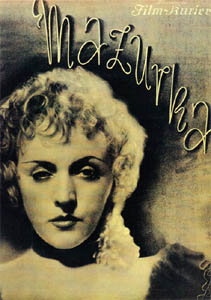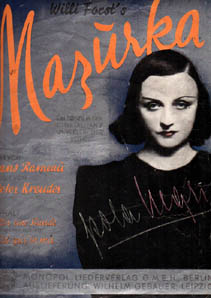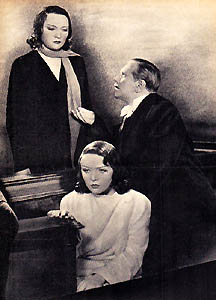
Pola Negri in Mazurka
Selections From Vintage Documents
Translated and annotated by Frank Noack, edited by David Gasten
Article added October 1, 2006
The following are translations of German texts that feature information on Pola during the period that she was making her greatest sound film, Mazurka (1935). These texts are almost impossible to come by in English-speaking countries and are a welcome addition for anyone interested in this lesser-known period of Pola’s career.
 |
Front cover of Mazurka promotional insert from the Film-Kurier, 1935. (Photo courtesy Frank Noack; click on photo for larger image) |
I. Film-Kurier (Germany's leading daily film magazine; Saturday, January 19, 1935)
POLA NEGRI BACK IN BERLIN
Yesterday evening at 9:32, Pola Negri arrived at the Friedrichstrasse Train Station. Willi Forst, director of the first [sound] film she will make in Berlin (the place where she originally developed as an artist), and Mr. von Zimburg, director of the Rota press department, received the artist at Bremerhaven, where she had arrived in the morning with the "Bremen". She will stay here for two months for the production of Mazurka. After this, she will return to Hollywood, where she will appear in the Metro film The Good Earth.
(Note: Rota is the name of the company that originally released Mazurka)
II. Autobiography of Peter Kreuder, composer of Mazurka’s film score
Then the cast was considered. We thought about Olga Tschechowa [a Russian actress who appeared in many German silents and early talkies, as well as the French film The Italian Straw Hat (1927) and the British film Moulin Rouge (1929)], and about Trude Hesterberg. We thought of a young, still unknown actress: Hilde Krahl, whom Forst would later star in his film Serenade. All these propositions were rejected. Until Forst one day told Pressburger and Rabinowitsch (Kreuder is referring to Arnold Pressburger and Gregor Rabinovich, the producers): "Gentlemen, don't beat me to death on the spot! I've got pictures from America. If this woman still looks the way she did on those pictures, she is very special. That woman is Pola Negri." Pressburger and Rabinowitsch clasped their hands together [a gesture of horror] and rolled their eyes. Pressburger was the first to calm down. "Listen, Forst! This woman must be at least eighty." Archives were consulted, and it was found out that she wasn't eighty, but that she was at the most fifty. The treatment was sent to Pola Negri, she principally answered “yes”. There were an awful lot of telegrams back and fourth, because Pressbuger and Rabinowitsch didn't want to be contractually obligated before having seen Pola Negri in person. They didn't want to rely on the photographs. (...)
She was asked to come to Germany and arrived with the next ship from New York to Bremerhaven. Forst also went to Bremerhaven, along with his friend Eddi Jürgensen and myself. Jürgensen was to teach Pola Negri the German language. She had mastered many languages, all of them equally badly. (...) Pola had already received a high fee in advance, and the voyage was paid for by the producers, needless to say. We arrived with cold feet and sweaty palms at Bremerhaven in the morning. At nine o’clock we were allowed to set foot on the "Bremen". A well-dressed pageboy led us up to the first class cabins. (...) We waited. We didn't exchange a single word. Everybody looked out of some window onto the port. Suddenly the door opened. Pola stood in front of us, in an incredible flowing, lilac gown, with snow-white makeup and black hair, more beautiful and interesting than ever: the queen of the silent movies. [Although I remained standing, i]n my mind I went down on my knees because of the grandeur and personality of this woman. She really hadn't aged; she seemed to have arrived from another world. After she kindly reached out her hand to us for a kiss, she suddenly seemed a bit tipsy. She trembled a bit and held on to the back of a chair. Then she excused herself and quickly went out of the room. We stayed back, irritated. After a few minutes she came back to the cabin. Her eyes were enlarged and shining, but I had the impression as if a sort of veil were over her face. On the side of her nose I noticed small crystal spots. I knew what it was; my cocaine-loving landlady Baumann had taught me that. (...)
 |
Cover of sheet music for Mazurka theme song, written by Peter Krueder. (Photo courtesy Joop van Dijk; click on photo for larger image) |
The following evening we arrived in Berlin and put our valuable import goods in the Hotel Adlon, where the Allianz (Kreuder means the Cine-Allianz, the production company of Mazurka) had reserved several rooms. After some days of relaxation, there were the first music rehearsals for Pola Negri. I had to get to know her timbre, the way she sang. (...) Her voice sounded quite good, but it was impossible for her to [sing higher than] a certain level. (...)
"Negri is blacklisted", Forst sighed. "She is a Jewess". (...) The whole film was, the way we had conceived it, not realizable with another actress. (...) There was no other [way around it, and] we had to tell Pola Negri personally about the decision of the minister. (...) Wordless, Forst gave her the letter the minister had written. Pola read it slowly, without any visible agitation. She stayed calm, went to her small house-bar, poured herself a triple shot of whisky, swallowed it quickly and asked: "What's the name of this man who signed this letter?" "Dr. Joseph Goebbels", Rabinowitsch said gloomily. "Gebbeles?" Pola laughed. "But that's a yiddish name! How can he be a minister in this state?" (...) Actually Pola managed to get an appointment with Goebbels that day. How she had managed that, nobody knows. And some hours later she had an appointment with Adolf Hitler. (...) When we talked about Goebbels in Pola's presence, she just smiled. Once, after her fourth chalice of whisky - on the set she always drank whisky from a silver chalice - she said mischievously: "And Goebbels is a Jew after all". We were dumbfounded. "Why, Pola?" "Now, I have seen [everything]" (...)
We had no difficulties with Pola Negri. She was generous, warm-hearted and candid. Whenever I came to her room for music rehearsals, she let the champagne flow and received me with such cordiality that I quickly [came to feel like] I had known her for many years. Despite Jürgensen's best efforts to teach her the German language, she continued to talk in her peculiar mixture of Polish, English, Yiddish, French, and German. She also continued to receive a silver chalice each day on the set, discreetly covered by a serviette, which contained pure whisky. At first we were afraid that, with such heavy drinking, Pola Negri would spend the shooting tumbling through the sets. But if you didn't know, you couldn't guess [that] she had [been drinking]. One bottle of whisky each day contributed to her well-being. However, at least during the shooting, she didn't take any more cocaine".
Peter Kreuder: Nur Puppen haben keine Tränen. Erinnerungen. 1971. Pages 241 ff.
(This autobiography should be read with some caution. Amongst other films, Kreuder claims to have scored The Blue Angel, never mentioning Frederick Hollaender and Franz Waxman, and never explaining why no source lists him. Also he claims to have written the score for the Hollywood movie Way of a Gaucho in 1952, allegedly starring Clark Gable; in the filmography at the end of his book, the leading man is called Gary Cooper, when in fact it was merely Rory Calhoun, and while Kreuder may have had some work on this western during his stay in South America, he is not the credited composer. He did, however, write an excellent score for Mazurka, and parts of his tale are confirmed by Forst's recollections.)
III. Autobiography of Willi Forst, director of Mazurka
(Willi Forst, director of Mazurka, was intrigued by a newspaper report about a 40-year-old mother who had shot a man who wanted to seduce her daughter, and who had seduced the mother as well when she was a young girl. The mother was found not guilty. Forst and screenwriter Hans Rameau decided to turn this story into a film, starring Pola Negri. Forst knew Carl Laemmle, who put him into contact with Pola.)
Now came a backlash I didn’t reckon with. "Forst! Are you insane? Negri made a film in Paris three years ago. They could only photograph her through sack-linen". The film couldn't be released. And Negri was already sailing with the "Bremen" towards Bremerhaven. The day of her arrival approached. Along with the [head] press agent from the release company, I drove to Bremerhaven. (...) When, without a doubt, the last passenger had left the ship, a ship officer came towards us: "Herr Forst, Frau Negri is waiting for you". We went onto the ship and were led into a cabin. We knocked. A sonorous female voice called [in English]: "Come in". Oh my God, I thought—she doesn't even speak German anymore. We entered. A luxurious apartment [with s]alon, bedroom, and bath. (...) The bathroom door opened and Negri stood in front of us. (...) I quickly calculated: Ernst Lubitsch had brought her to Berlin shortly after World War I, as a young ballet dancer of the Warsaw Opera. That was around 1920 and she was around 20. Thus, now she must have been 35. She looked much older. No wonder, with her living habits. She came from the bathroom, having forgotten to clean her face; under her nose one could clearly see snow. She not only took cocaine, she also drank like a fish. After shooting [for Mazurka] had ended - after about six weeks - more than a dozen empty bottles were found in her wardrobe: gin, whisky, (...) Before my trip to Bremerhaven I managed to get the French film that had starred her. She didn't look badly in it. For her close-ups she had been photographed through thick veils, which hadn't been necessary, because as soon as she was a certain distance from the camera, she looked quite good.
Willi Forst. Posthumously published autobiographical fragments in: Armin Loacker (Ed.): Willi Forst. Ein Filmstil aus Wien. Film Archiv Austria; 2003. Page 571 ff.
(Forst writes that, when shooting was interrupted, Pola went to Cannes, waiting to be called back to Berlin for work. It seems she didn't spend any of her free time in Germany. Note that Forst writes that on the "Bremen" cabin he visited Pola together with a press agent, while Kreuder writes he had been in the company of Forst and actor Edwin Jürgensen. Forst's version is confirmed by the Film-Kurier.)
IV. Autobiography of Albrecht Schoenhals, Pola’s co-star in Mazurka
Yes, she knew the melodramatic tones. Passion was her life elixir, out of which she rejuvenated herself. Her desire to shake the world with her erotic temperament seemed unappeasable. When we rehearsed our big seduction scene, she told me, full of feverish emphasis: "Albrecht! The scene must get much more [copying her accent] earrroatic! Much more sexual! We are the most earroatic couple in all Europe! In Paris I have shot scenes: partner carries me downstairs. Tears down the front part of my dress - we can't do that hearrrre!" One easily felt how much she suffered. (...) She was a magnificent colleague. I could listen to her for hours, when she told me humorous stories with her dark, cracked voice, whose truth was not always confirmable. She lived out of the richness of her emotions and continuously produced herself in the most enchanting manner.
Albrecht Schoenhals/Anneliese Born: Immer zu zweit. Erinnerungen. Limes, Wiesbaden & München. 1977 Page 164.
(Anneliese Born was Schoenhals's wife; they co-authored the book.)
V. Joseph Goebbels, The Goebbels Diaries. Diary entry for November 13, 1935.
Mazurka by Forst with Pola Negri. Really virtuously made. And Negri acts breathtakingly.
VI. Variety, January 1, 1936.
(Variety magazine regularly reviewed important new films even if they were not shown in the U.S., unlike the New York Times, which only reviewed films that got shown in New York.)
“Pola's comeback into the Teutonic film arena is a victorious re-entry. No one had been able to fill that niche which has stood vacant ever since her departure for Hollywood some years ago. (...) After this, the unsatisfactory co-operation between Negri and Hollywood remains more of a mystery than ever".
(back to Articles and Movie Reviews)


